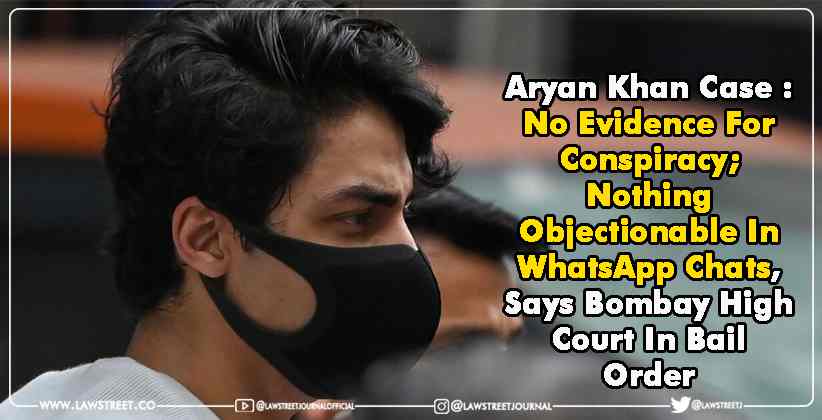The Bombay high court, in its reasoned order following the grant of bail in the high-profile Mumbai cruise drugs case October 28, said: Merely because of Applicants were travelling on the cruise, that by itself cannot be termed as satisfying foundation for invoking provisions of Section 29 (conspiracy) against the Applicants - Aryan Khan, Arbaaz Merchant and Munmun Dhamecha.
The court stated "nothing objectionable" was found in chats extracted from Aryan's phone. Justice Nitin Sambre said, After having gone through the Whatsapp chats extracted from (Aryan Khans) phone, nothing objectionable could be noticed to suggest that he and Arbaaz or all three applicants along with other accused persons in agreement have meeting of minds and have hatched conspiracy committing the offence in question.
"That Aryan Khan was not found in possession of any objectionable substance is not in dispute" the high court said in a 14-page order. It also stated that the quantity of drugs which was seized from the possession of (Arbaaz and Munmun), if independently considered, is a small quantity, is not disputed fact."
The NCB had arrested the trio on October 3 following a raid on October 2 at the International Cruise Terminal on secret information about an alleged party on the cruise which was set to leave for Goa from Mumbai.
The NCB's case was that it had recovered 6 grams of charas from Arbaaz and 5 grams of hash from Munmun and arrested eight person that day and in all 20 accused in the case so far including one with commercial quantity. The agency, through additional solicitor Anil Singh, relying on the provisions of section 29 (offence of conspiracy) under NDPS Act, however, claimed that cumulatively, commercial quantity of drugs was seized" from those accused in the case and that it was a case of larger conspiracy and hence bail be denied.
The HC is required to be sensitive to the fact that there has to be presence of basic material in the form of evidence so as to substantiate the case of conspiracy against the applicants."
There is absence of material on record of them having such meeting of minds with other Accused who were named in the offence in question. Case of the prosecution that Applicants have admitted to commit an offence also amounts to an offence under the NDPS Act. Even if it is appreciated, the maximum punishment prescribed is not more than one year for such offence. Applicants have already suffered incarceration for almost 25 days, said Justice Sambre, adding that they were not even subjected to medical examination so as to determine whether at the relevant time, they had consumed drugs".
Aryans counsel Mukul Rohatgi, Satish Maneshinde and Arbaazs counsel Amit Desai and Taraq Sayed had argued that for an offence of conspiracy there has to first be a meeting of mind before the act is committed. The high court said before inferring any act of conspiracy there has to be a positive evidence about such an agreement to commit an unlawful act or a lawful act by unlawful means and it must be prior and must have a meeting of minds
There is hardly any positive evidence to convince this court that all accused with common intention agreed to commit unlawful act, said the order. Rather the investigation carried out till this date suggests that (Aryan and Arbaaz) were travelling independent of (Munmun) and there was no meeting of minds," it said.
There is no material on record to infer that applicants have hatched conspiracy to commit a drug offence, hence difficult to infer at this stage that they are involved in an offence of commercial quantity, held the HC in its reasoning, released on Saturday, for the bail. While Aryan was released on October 30, the two others were released from jail later.
Justice Sambre clarified a position in law and stated that "confessional statements" recorded under Section 67 of Narcotic Drugs and Psychotropic Substances (NDPS) Act can be considered only for investigation purpose and cannot be used as a tool for drawing inference that the applicants have committed an offence under the Act as has been alleged against them".
The high court referred to the Supreme Court ruling in Toofan Singh which said NCB officers are also police officers and confessional statements recorded by them are not admissible evidence and rejected NCB claims that Khan and the two others had accepted their involvement. The high court said, Once the confessional statement of the Applicants/Accused cannot bind them of the offence in view of the Judgment of Supreme Court in the matter of Toofan Singh , the claim put forth by the Respondent (NCB) that Accused persons have accepted their involvement in the crime is liable to be rejected."








